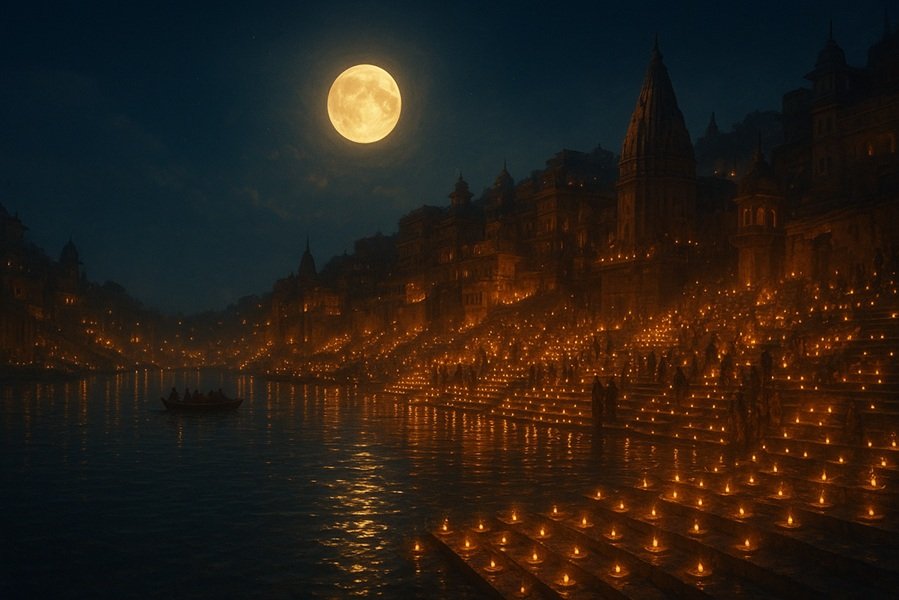Diwali vs Dev Deepawali: Understanding the Difference Between the Two Festivals of Lights
Introduction
India is the land of festivals — a place where every celebration tells a story of light triumphing over darkness. Among the most captivating are Diwali and Dev Deepawali.
Though both festivals are known as the “Festival of Lights,” they are distinct in meaning, timing, and traditions.
While Diwali is celebrated across India to mark the return of Lord Rama to Ayodhya, Dev Deepawali is observed primarily in Varanasi, believed to be the time when the gods themselves descend to celebrate Diwali on the banks of the Ganga.
What Is Diwali?
Origin and Significance
Diwali, also known as Deepavali, is one of India’s grandest festivals, celebrated to commemorate Lord Rama’s return to Ayodhya after 14 years of exile and his victory over the demon king Ravana. Symbolically, it represents the triumph of good over evil and light over darkness.
For others, it also honors Goddess Lakshmi, the deity of wealth and prosperity, and marks the Hindu New Year in many regions.
When Is Diwali Celebrated?
Diwali is observed on the Amavasya (new moon night) of the Hindu month of Kartika, usually falling in October or November.
In 2025, Diwali will be celebrated on October 20.
How Is Diwali Celebrated?
- Lighting diyas and candles around homes and temples
- Lakshmi Puja in the evening
- Bursting of fireworks and decorating homes with rangoli
- Sharing sweets, gifts, and joy among family and friends
- Cleaning and decorating homes to welcome Goddess Lakshmi
What Is Dev Deepawali?
Origin and Mythological Significance
Dev Deepawali, also known as the Festival of Lights of the Gods, is celebrated fifteen days after Diwali, on the full moon night (Purnima) of the Kartika month.
According to Hindu belief, it marks the occasion when Lord Shiva defeated the demon Tripurasura, restoring peace in the universe. The gods celebrated this victory by lighting up the heavens — and devotees replicate that divine celebration on Earth.
Where Is It Celebrated?
The festival is most prominently observed in Varanasi (Kashi), one of the world’s oldest living cities. On this day, the ghats of the Ganga — Dashashwamedh, Assi, Panchganga, Rajendra Prasad, and others — are illuminated with millions of earthen lamps (diyas).
It’s believed that on Dev Deepawali, the gods descend to bathe in the Ganga.
When Is Dev Deepawali Celebrated?
Dev Deepawali falls on Kartik Purnima, about 15 days after Diwali.
In 2025, Dev Deepawali will be observed on November 5.
How Is Dev Deepawali Celebrated?
- Lighting of millions of diyas along the Ganga ghats
- Ganga Aarti performed by priests with grandeur and devotion
- Boat rides on the Ganges offering stunning night views
- Offering prayers to ancestors (Deepdaan)
- Cultural performances and traditional music on ghats
Diwali vs Dev Deepawali: Key Differences
| Aspect | Diwali | Dev Deepawali |
|---|---|---|
| Meaning | Celebration of Lord Rama’s return and victory over evil | Celebration of Lord Shiva’s victory over Tripurasura |
| Date | Amavasya (new moon night) of Kartika month | Purnima (full moon night) of Kartika month, 15 days after Diwali |
| Significance | Festival of lights for humans | Festival of lights for gods |
| Main Deity Worshipped | Goddess Lakshmi and Lord Ganesha | Lord Shiva |
| Celebrated In | All over India | Mainly in Varanasi (Kashi) |
| Rituals | Lighting diyas, Lakshmi Puja, sweets, fireworks | Ganga Aarti, lighting diyas on ghats, Deepdaan |
| Symbolism | Triumph of good over evil | Divine celebration of victory by the gods |
Spiritual Significance of Dev Deepawali in Varanasi
During Dev Deepawali, Varanasi transforms into a celestial realm. The reflection of thousands of glowing diyas on the Ganga waters creates a breathtaking view that symbolizes moksha (liberation) and divine light.
It’s believed that taking a holy dip in the Ganga on Kartik Purnima washes away sins and brings spiritual merit. Many devotees travel from across India and abroad to witness this ethereal spectacle.
Environmental and Cultural Harmony
Both festivals spread the message of peace, harmony, and light — reminding us to overcome darkness within and around us.
In recent years, there has been a growing emphasis on celebrating both Diwali and Dev Deepawali in eco-friendly ways — using clay diyas, organic rangoli, and avoiding firecrackers to protect the environment and preserve cultural authenticity.
Conclusion
While Diwali unites the nation in joy, prosperity, and the victory of light, Dev Deepawali adds a spiritual dimension, when even the gods are believed to celebrate in Varanasi.
Both festivals reflect the timeless Indian philosophy — that light, whether divine or human, always triumphs over darkness.
So, this year, whether you light diyas at home for Diwali or visit the ghats of Varanasi for Dev Deepawali, remember:
✨ Every flame you light is a prayer for peace, purity, and enlightenment.

